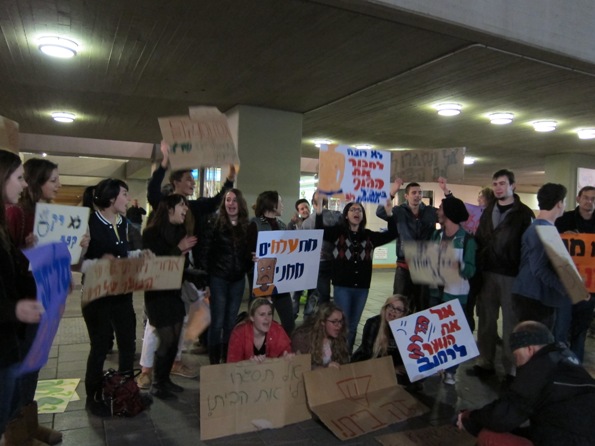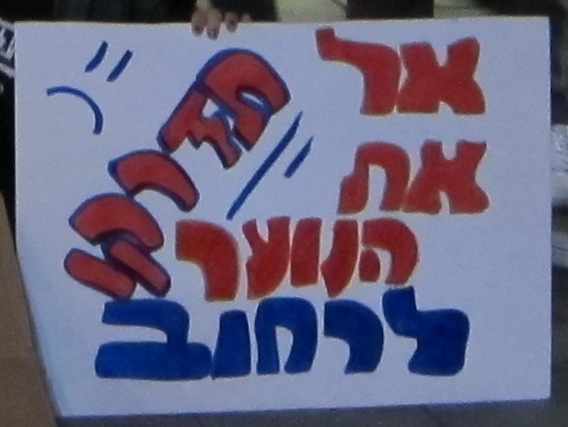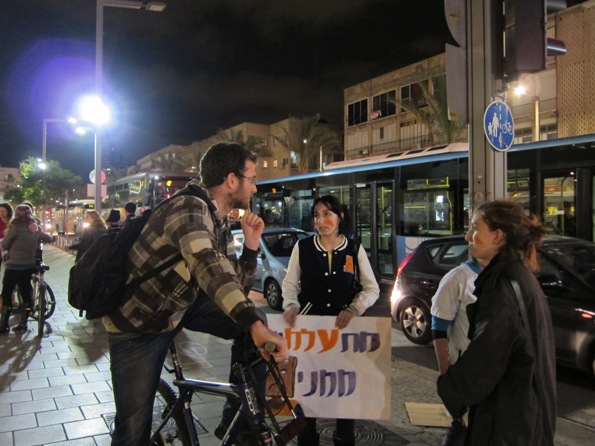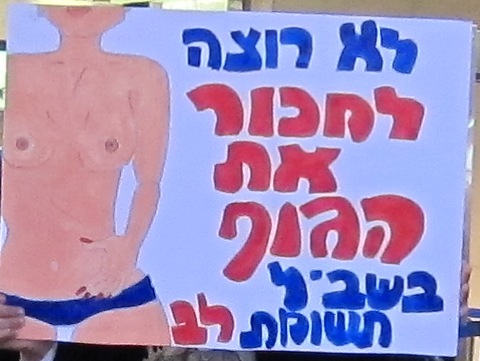
“It was a tough time for me because my parents had just died and I was,” the young woman paused slightly then continued, “I was very… you know…in a bad way emotionally. Hafuch really helped me and it’s a shame that they want to close a center like this that helps ‘regular’ kids who can easily fall into becoming ‘youth at risk’. I was very close; I was really on the edge.”
Y., an attractive, confident young woman of 19, was one of many who gathered at the Tel Aviv Municipality to protest the closing of Hafuch Tel Aviv, on Thursday, December 15, 2011. Hafuch al Hafuch is a center for information and counseling run by Elem, a nonprofit organization that reaches out to youth in distress. Elem has decided to close Hafuch Tel Aviv on December 30, 2011, due to lack of funds.
Amir Delumy, Director of Elem information centers and Hafuch country wide, was present at the protest. When asked to comment on Elem’s decision to close Hafuch, he said, “The closing is a painful move. Hafuch has been active in Tel Aviv for 14 years, it was the first Hafuch center we established. We’ve been running this on our own for 14 years at a yearly cost of over 300,000 NIS without any participation of the Tel Aviv Municipality. This year as a result of the worldwide financial crisis there has been a decrease in donations and we were forced to close several projects in Israel, including Tel Aviv. The reason we chose Hafuch Tel Aviv is because the municipality is not willing to take any part in supporting the project, they are not willing to take responsibility for the young people, who are the young people of Tel Aviv. They have been impervious to our appeals to them throughout the years. More recently, our request that they take up the challenge and support Hafuch has met with a complete lack of response. Hafuch has centers throughout the country, we have 15 such centers…and in each council the municipality participates with anywhere from 30% to 100% of the costs. It’s not just a matter of financial support; it’s making a statement in terms of taking responsibility for the youth of the city, their education and care. In Tel Aviv, I am sorry to say, that is not the case.”
Whatever the financial considerations, it is clear that closing Hafuch Tel Aviv will hurt a large number of young people for whom this the one place they feel at home. What makes Hafuch different from other child welfare programs and social services? It is an open, inviting center with a good vibe, and young people like to hang out there. It is the only place that has the potential to prevent problems or solve a situation before it comes to a crisis.
Young people are drawn to the place, for many it becomes a kind of home. There are several places in Tel Aviv where teenagers hang out – Dizengof Center, Meir Garden, the beach and other places. The urban environment doesn’t offer many places where a person can spend several hours without spending any money. Teenagers tend to congregate outdoors or in malls, although often a group of teens may be told to leave the mall. For teens whose home is not a place that feels good or safe, there is almost literally nowhere to go.

Y. told me that she first heard of Hafuch when she was 14 years old, she said, “I was at the center [Dizengof Center] with a friend and a boy came up to us and said hey there’s a place called Hafuch al Hafuch and they have coffee and air-conditioning so let’s go there…it was fun to hang out with the kids there and to this day the friends I made there are my best friends.”
When asked if she thinks she would have turned to another source for help – a school counselor, social worker or some other entity, Y. said, “No. I didn’t come to Hafuch for help, I was just there and they helped me.”
The enormous impact of Hafuch on the lives of young people can be seen in the protest itself: the movement to protest the closing of Hafuch has been initiated and led entirely by these young people, ranging in age from 13 to 19. They have launched a petition against the closing on the internet; there is a protest headquarters page on facebook, as well as a page for the protest that took place on December 15th. At the protest they chanted, sang and explained their position to people passing by. Standing at the intersection, they encouraged drivers to honk their support.

Yet to this date, there has been no response to the appeals of these young people. Whatever the financial negotiations or internal politics of Elem and the Tel Aviv Municipality, it is clear who will be hurt by this decision: these young people and many others like them in the time to come, for there is no other center like Hafuch.
J. a 19 year old who was an Hafuch ‘regular’ between the ages of 15 and 18 [the center is only open to minors], said, “I don’t think there is any other place like Hafuch, you come and they help you…without messing with you. You come and they will do anything to help you – counseling, guidance, food if you haven’t had anything to eat all day, something to drink. After December 30th 100 Tel Aviv kids will be thrown out on the street and won’t have anyone to help them. Whether its kids who are trying drugs or kids who’ve been thrown out of their house or kids who are gay and don’t have anyone to help them…and it shouldn’t be allowed to happen.”

It is not clear what can be done, but I urge anyone who understands the importance of Hafuch and cares about the young people of Tel Aviv to protest the closing of Hafuch Tel Aviv and make your voice heard.
What can be done? Share this story with others, make it known. Perhaps there is an individual or an organization out there with the ability to help Hafuch stay open. Sign the petition; join the facebook pages to show your support for these young people.
On Monday, December 26, 2011, the Tel Aviv Municipality will hold a council meeting to determine their budget. There is still a chance to influence their decision to include funding for Hafuch Tel Aviv. Make your voice heard online: follow this link for email addresses of council members.
What will be the ultimate decision on Hafuch? Who will have the final say? Y.’s words remain with me: “There is no replacement for Hafuch. It was a place that was fun to be and along the way they helped me a lot. I think it’s a shame for all the young people who will be lost. Hafuch saves lives.”






[…] in Tel Aviv, was forced to close for lack of funds after 14 years. (Read more about it here and here) Testimony to the impact of these centers is the fact that the very young people who turn to Hafuch […]
Comments are closed.